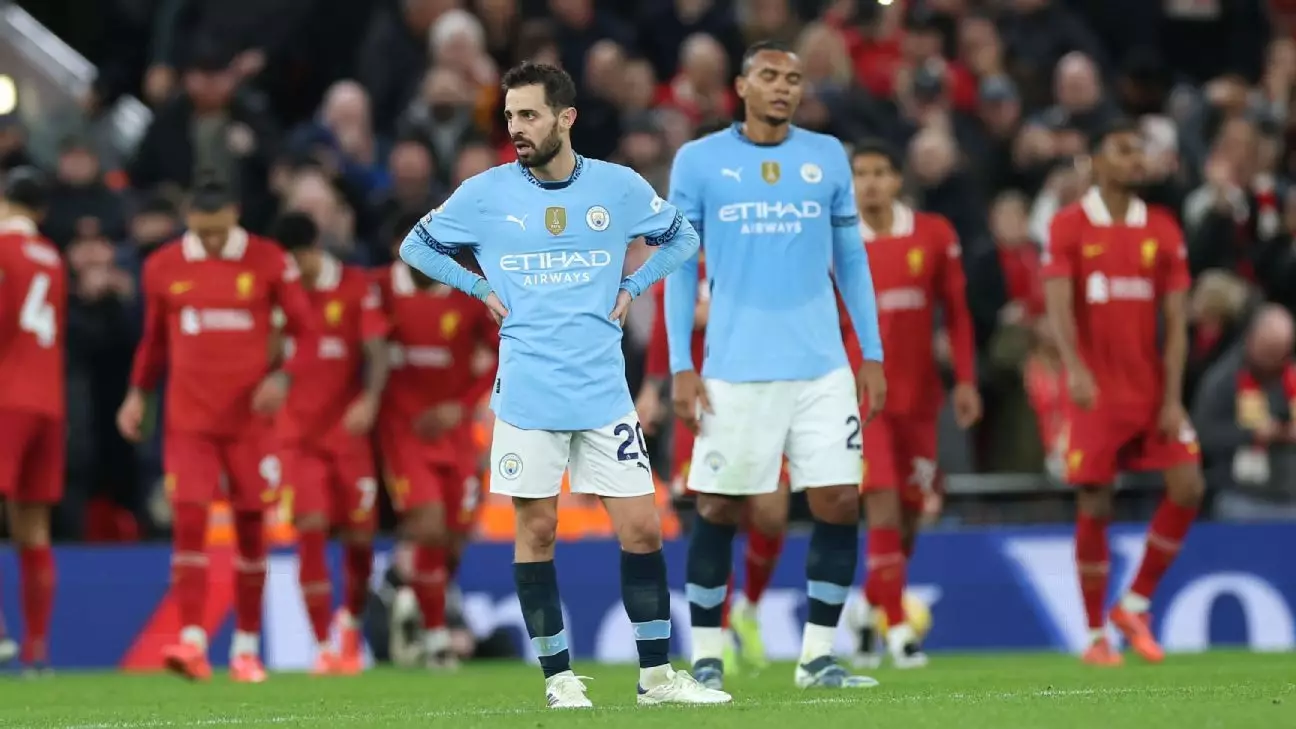In the world of football, periods of intense success are often followed by unexpected declines, shaping the narrative of clubs that once basked in glory. Manchester City’s recent performance trajectory bears all the hallmarks of a team at a crossroads. Just last season, City was reveling in its achievements, having claimed the Premier League title and the Champions League. However, the harsh realities of competition have swiftly surfaced, illuminating profound cracks in their previously unassailable armor.
Drawing parallels with other major English clubs, one cannot help but reflect on Manchester United’s post-Ferguson struggles and Liverpool’s painful fall from grace in the 1990s. Both clubs clung to the remnants of their former dominance, often confusing past achievements with an unmerited belief in a bright future. The current predicament at Manchester City serves as a reminder that success is not perpetual; it demands constant evolution and adaptation.
The telling signs of Manchester City’s decline are evident. As they succumbed to a 2-0 defeat against Liverpool, a sixth loss in seven matches became a stark portrayal of an empire in distress. Once a unit characterized by energy and cohesion, City now appears disjointed and devoid of the vibrancy that once made them a formidable opponent. Key players such as İlkay Gündoğan, Kevin De Bruyne, Nathan Aké, and Kyle Walker are beginning to show their age. What stands out is the stagnation in recruitment, where strategic acquisitions have faltered, leaving the squad looking more like a collection of has-beens than an energized team eager to reclaim its lost prominence.
City’s recent performance is rife with instances where age and declining physical condition overshadow talent. Gündoğan’s return from Barcelona, despite being celebrated, has proven detrimental; he lacks the dynamism required to compete in a league defined by its pace. As he struggles alongside Matheus Nunes in the midfield, it’s clear that City has not effectively replaced the quality players who laid the foundations of their success.
The Perils of Complacency and Poor Recruitment
Complacency within the club has led to critical misjudgments in the transfer market. The departures of once-stalwart players such as Raheem Sterling, Gabriel Jesus, and Aymeric Laporte, alongside young talents like Cole Palmer and Julián Álvarez, have not been compensated for. The errors made in recruitment, combined with an inability to identify promising prospects for key positions, echo the mistakes that plagued rivals in the past.
Manchester City’s dilemma is accentuated by disruptions off the field, most notably the club’s ongoing battle with charges regarding financial misconduct. These off-field issues can seep into the strategic decisions made regarding player acquisitions and overall team management—contributing to a cycle that puts the club further behind in rebuilding efforts.
A successful football club is often defined by its ability to evolve. Not only does this require a blend of youth and experience, but it also necessitates a clear vision of succession planning. City’s failure to proactively replace aging stalwarts such as De Bruyne and Walker suggests a lack of foresight that could hinder their ability to reclaim their competitive edge.
The recent surge in success from teams like Bournemouth and Brighton only highlights City’s vulnerabilities. These teams exhibit not only tactical acumen but also youthful exuberance—a recipe for success that City must urgently replicate. The timid performances against mid- to lower-tier teams indicate that the once-feared reputation of City is eroding, resulting in opponents capitalizing on its vulnerabilities.
The descent from greatness is never sudden; it is often characterized by a series of small missteps that gradually build to a significant downfall. Currently, Manchester City is at a pivotal juncture as the evidence of decline becomes increasingly apparent. To navigate this turbulent chapter, the club must acknowledge its frailties and invest in a strategy that focuses on rejuvenation rather than nostalgia.
Time is of the essence for City. The football world is watching closely, and should the club delay its course correction, it might find itself embroiled in a prolonged struggle for relevance akin to what has befallen Manchester United and Liverpool in the past. The key to reclaiming former glories lies in embracing change, thus ensuring that the shadows of past successes do not cast a pall over its future.

